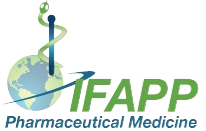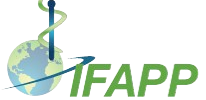By Richard K Rondel, FRCP, FFPM (United Kingdom)
The foundations of IFAPP were laid in 1970 by three British Pharmaceutical Physicians, Bill Burland, Jan Jouhar and Richard Rondel, who conceived the idea of holding an international meeting of Medical Advisers (as pharmaceutical physicians were then known), that would bring together physicians and scientists from the pharmaceutical industry with those working in research institutes and academic medicine. Their objective was to internationalize the advancement of knowledge of therapeutic agents and their actions, and also to foster the relationship between industry and academia.
They formed an organizing committee, drafted a program, contacted speakers, found a conference venue and, importantly for the discipline, they were able to secure the patronage of His Royal Highness, Prince Philip, the Duke of Edinburgh.
The resulting “International Meeting of Medical Advisers in the Pharmaceutical Industry” (IMMAPI) was held in London, UK, in April 1972 and attracted 500 delegates, drawn from virtually every country in the world. The success of this meeting led to a decision that it should be repeated, and that this should be linked to the formation of some form of International Association to which the Associations of Medical Advisers around the world could affiliate themselves. A steering committee was formed immediately, consisting of
- a Working Party representing all existing associations of Medical Advisers and
- a body of correspondents representing those countries without such an association.
First, it was agreed that an International Federation of Associations of Medical Advisers to the Pharmaceutical Industry (IFAMAPI) should be formed. An outline constitution was drafted and circulated to the 12 countries (Argentina, Belgium, Brazil, France, Germany, India, Italy, Japan, South Africa, Sweden, The Netherlands and the United Kingdom) that had Associations of Medical Advisers at that time. The Working Party had its first meeting in April 1973.
Second, it was agreed that the Second International Meeting of Medical Advisers in the Pharmaceutical Industry (2nd IMMAPI) would be held in Florence, Italy, in October 1975. A theme was agreed and the program put into first draft.
The composition of the Planning Committee for the Second IMMAPI was drawn from the membership of the Italian organization, SSFA (Society for Applied Pharmacological Sciences). This arrangement became the model for subsequent meetings in the series. Inter alia, it was felt that in this way the position of the host Association would become more firmly established in its own country – an expectation which has been borne out in every subsequent meeting.
In January 1975 a notice was sent out to all potential delegates attending the Second IMMAPI in Florence. This contained the draft constitution together with proposals for the election of an Executive Committee charged with running the affairs of the International Federation. One complete session of the Florence meeting was set aside for the official foundation of IFAMAPI. At this foundation meeting, the title of the Association was changed to “International Federation of Associations of Pharmaceutical Physicians” (IFAPP) to reflect the general move away from regarding industry doctors simply as Medical Advisers.
The arrangements thus agreed became the bedrock for the future development of both IFAPP and subsequent International Conferences on Pharmaceutical Medicine (ICPMs).
Since then, the series has developed as follows (Table 1):
Table 1. International Conferences on Pharmaceutical Medicine (ICPMs) from 1978 to the present time
ICPM – City – Year – Host Association – IFAPP President
- 3rd – Brussels – 1978 – ABEMIP/BEVAFI, Belgium – Dr Herman Lahon
- 4th – Paris – 1981 – AMIP, France – Dr Richard Rondel
- 5th – Munich – 1984 – FÄPI, Germany – Prof Klaus-Jürgen Hahn
- 6th – Brighton – 1987 – BrAPP, UK – Dr Denis Burley
- 7th – Madrid – 1990 – AMIFE, Spain – Dr Jacques Grimbert
- 8th – Rome – 1994 – SSFA, Italy – Dr Luciano Fuccella
- 9th – Stockholm – 1996 – LILF/SAPP, Sweden – Prof Anders Rosen
- 10th – Boston – 1998 – AAPP, USA – Prof Peter D Stonier
- 11th – Berlin – 2000 – DGPharMed, Germany – Prof Jean-Marc Husson
- 12th – Cancun – 2002 – AMEIFAC, Mexico – Dr Johanna Schenk
- 13th – Geneva – 2004 – SGPM/SwAPP, Switzerland – Dr Domenico Criscuolo
- 14th – Seoul – 2006 – KSPM, Korea – Dr Christopher Allen
- 15th – Amsterdam – 2008 – NAPM, The Netherlands – Dr Luis Collia
- 16th – Barcelona – 2012 – AMIFE, Spain – Dr Rudolf van Olden
- 17th – Berlin – 2014 – DGPharMed, Germany – Dr Yil-Seob Lee
- 18th – Sao Paulo – 2016 – SBMF, Brazil – Dr Gustavo Kesselring
- 19th – Tokyo – 2018 – JAPhMed, Japan – Dr Kyoko Imamura
- 20th – Athens – 2022 – E.L.E.F.I., Greece – Dr Varvara (Barbara) Baroutsou
- 21st – Amsterdam – 2025 (April) – NVFG, The Netherlands – Eric Klaver
Each meeting produced an imaginative program reflecting the evolving pattern of drug development internationally, and the increasingly important role of the pharmaceutical physician in that process.
The proceedings of the early ICPMs have been published in book form, and provide a unique record of the development of Pharmaceutical Medicine. The list of publications so far is shown in Table 2.
Table 2. Publications resulting from ICPMs
- International Aspects of Drug Evaluation and Usage (1972)
- The Rationality of Drug Development (1975)
- Pharmaceutical Medicine – The Future (1978)
- Drug Safety – Progress and Controversies (1981)
- Drugs Between Research and Regulations (1984)
- The Focus on Pharmaceutical Knowledge (1987)
- Communications in Pharmaceutical Medicine (1990)
- Drug Development in the 90’s – A Global Commitment (1994)
In addition to sponsoring the major international meetings IFAPP has provided a framework within which national associations, particularly the smaller ones, can hold local meetings. This is an aspect which will hopefully grow.
In 1997, in collaboration with the European Medicines Agency (EMA), IFAPP initiated the organization of annual EMA-IFAPP conferences at the EMA, in London, UK:
- 1st – 10 October 1997 – Challenges in Clinical Development of Medicinal Products: How to Revitalize the Process
- 2nd – 29 January 1999 – Improving Co-Operation in the Clinical Development Process
- 3rd – 21 March 2000 – Crisis Management Concerning the Clinical Safety of a Medicinal Product
- 4th – 16 March 2001 – Managing Quality in Clinical Research and Development
- 5th – 22 February 2002 – Clinical Studies at the Extremes of Age
- 6th – 21 February 2003 – Biotech Products: Current Issues and Comparability
- 7th – 9 November 2004 – Orphan Drugs: Current Issues and Activities
- 8th – 17 February 2006 – EudraVigilance and Risk Management
- 9th – 19 October 2007 – Europe’s Role in Clinical Research: Challenges and Opportunities
- 10th – 30 January 2009 – Quality Issues in Clinical Research
- 11th – 4 – 5 February 2010 – Joint EMA / DIA / IFAPP Pharmaceutical Policy Forum
In summary, since its inauguration in April 1972, IFAPP has grown steadily in size and scope. It has amply fulfilled its original objectives and, in particular, has provided support and encouragement for the development and strengthening of associations at the national level. IFAPP can justifiably be proud of its achievements so far and can look forward with confidence to its strong, prosperous and active development in the years ahead. Its three founders could not have asked for more.
Below you will find a complete list of IFAPP Past Presidents:
- Dr Herman Lahon (Belgium): President 1975-1978
- Prof Richard Rondel (UK): President 1978-1981
- Prof Klaus-Jürgen Hahn (Germany): President 1981-1984
- Prof Denis Burley (UK): President 1984-1987
- Dr Jacques Grimbert (Spain): President 1987-1990
- Prof Luciano M Fuccella (Italy): President 1990-1994
- Prof Anders Rosen (Sweden): President 1994-1996
- Prof Peter D Stonier (UK): President 1996-1998
- Prof Jean-Marc Husson (France): President 1998-2000
- Dr Johanna Schenk (Germany): President 2000-2002
- Prof Domenico Criscuolo (Italy): President 2002-2004
- Dr Christopher Allen (USA): President 2004-2006
- Dr Luis Collia (Argentina): President 2006-2008
- Prof Gerfried Nell (Austria): President 2008-2011
- Dr Rudolf van Olden (the Netherlands): President 2011-2012
- Dr Yil-Seob Lee (Korea): President 2012-2014
- Dr Gustavo Kesselring (Brazil): President 2014-2016
- Dr Honorio Silva (USA): President 2016-2018
- Prof Kyoko Imamura (Japan): President 2018-2020
- Dr Marco Romano (Italy): President 2020-2022
- Dr Varvara (Barbara) Baroutsou (Greece): President 2022-2024 (April 2025)
 International Federation of Associations of Pharmaceutical Physicians and Pharmaceutical Medicine
International Federation of Associations of Pharmaceutical Physicians and Pharmaceutical Medicine